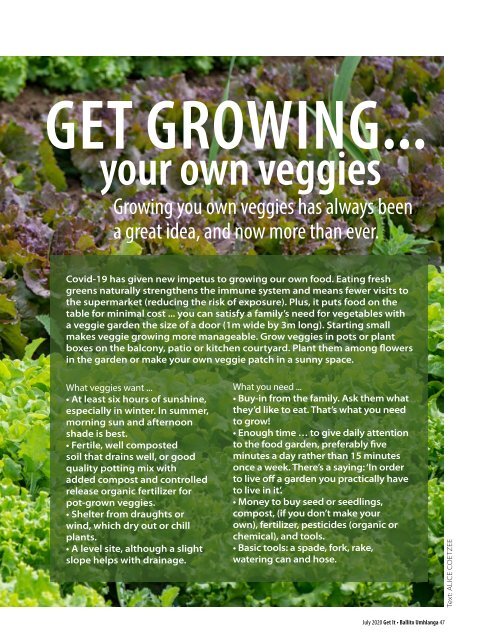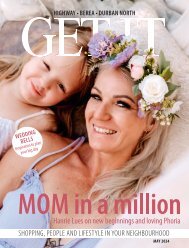July 2020 - Ballito Umhlanga
Conscious living. Thinking before you speak. Acting with intention. Placing careful thought into the things you do, eat and buy. This month we turn our attention to the art of being mindful. From making small changes like 'meat-free-Mondays' and choosing low or no-alcohol drinks, to listening to positive podcasts that encourage kindness (to yourself and others) and taking time out to care for your body, mind and soul … we are embracing all that is good and healthy.
Conscious living. Thinking before you speak. Acting with intention. Placing careful thought into the things you do, eat and buy. This month we turn our attention to the art of being mindful. From making small changes like 'meat-free-Mondays' and choosing low or no-alcohol drinks, to listening to positive podcasts that encourage kindness (to yourself and others) and taking time out to care for your body, mind and soul … we are embracing all that is good and healthy.
Create successful ePaper yourself
Turn your PDF publications into a flip-book with our unique Google optimized e-Paper software.
GET GROWING...<br />
GARDEN<br />
your own veggies<br />
Growing you own veggies has always been<br />
a great idea, and now more than ever.<br />
Covid-19 has given new impetus to growing our own food. Eating fresh<br />
greens naturally strengthens the immune system and means fewer visits to<br />
the supermarket (reducing the risk of exposure). Plus, it puts food on the<br />
table for minimal cost ... you can satisfy a family’s need for vegetables with<br />
a veggie garden the size of a door (1m wide by 3m long). Starting small<br />
makes veggie growing more manageable. Grow veggies in pots or plant<br />
boxes on the balcony, patio or kitchen courtyard. Plant them among flowers<br />
in the garden or make your own veggie patch in a sunny space.<br />
What veggies want ...<br />
• At least six hours of sunshine,<br />
especially in winter. In summer,<br />
morning sun and afternoon<br />
shade is best.<br />
• Fertile, well composted<br />
soil that drains well, or good<br />
quality potting mix with<br />
added compost and controlled<br />
release organic fertilizer for<br />
pot-grown veggies.<br />
• Shelter from draughts or<br />
wind, which dry out or chill<br />
plants.<br />
• A level site, although a slight<br />
slope helps with drainage.<br />
What you need ...<br />
• Buy-in from the family. Ask them what<br />
they’d like to eat. That’s what you need<br />
to grow!<br />
• Enough time … to give daily attention<br />
to the food garden, preferably five<br />
minutes a day rather than 15 minutes<br />
once a week. There’s a saying: ‘In order<br />
to live off a garden you practically have<br />
to live in it’.<br />
• Money to buy seed or seedlings,<br />
compost, (if you don’t make your<br />
own), fertilizer, pesticides (organic or<br />
chemical), and tools.<br />
• Basic tools: a spade, fork, rake,<br />
watering can and hose.<br />
Text: ALICE COETZEE<br />
<strong>July</strong> <strong>2020</strong> Get It • <strong>Ballito</strong> <strong>Umhlanga</strong> 47


















